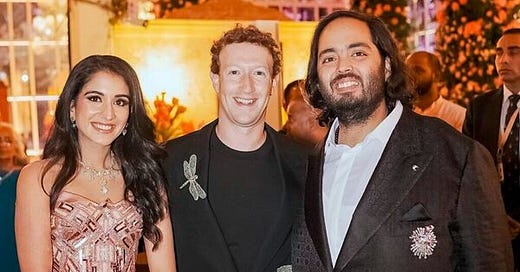Why Inequality May be the Cause of American Gloom About Their Economy - and Implications for India
Anyone following US politics will know that a key component of the upcoming Presidential election is the state of the economy - or rather how people feel about the economy. This is because there appears to be a widespread divergence between how the US economy is actually performing and people's perception of it. Numerous surveys show that even though most Americans rate their personal finances as comfortable, their view of the overall economy remains gloomy. For instance, 56% of Americans believe the US is in recession when it's not, and nearly half think unemployment is at a 50-year high when it's actually near a 50-year low. This generalized sense of economic doom and gloom may cost President Biden his reelection.
There are several theories to explain this disconnect between personal finance and the overall economic outlook. One blames persistently negative media coverage and misinformation, as people rely on media for aggregate economic information. Another cites political bias, with Republicans rating the economy more poorly than Democrats, though the divergence between personal finance and estimation of overall economy exists across party lines. Other theories include post-pandemic anxiety and nostalgia for the Trump-era economy and prices. While these theories may hold some truth, they don't point to solutions, as they locate the cause in irrationality, partisanship, or bad faith.
A more common theory attributes the economic gloom to persistent inflation. While inflation has moderated from 2022 peaks, high price levels remain, feeding into negative sentiments. High interest rates exacerbate the affordability concerns by increasing costs like mortgages. However, skeptics argue that wage growth, including for low and middle-income earners, has outpaced inflation, maintaining or increasing purchasing power – a claim supported by robust consumption and spending levels.
I believe one crucial aspect has been overlooked in this debate – inequality. In fact the New York Times and Politifact did entire articles on the various theories without mentioning inequality even once. When discussed in the context of this debate, inequality has appeared as a technical issue – that policy impacts take time to trickle down to all segments. It has thus been brought to qualify the point that wage increases have kept up with inflation to argue that for some segments wage increases have not fully caught up with inflation - yet.
However, there's a deeper political problem. Inequality creates an aspiration-reality mismatch. People do not want to run to stay where they are. Even though wages may have increased, most people are still not moving forward in life - they are simply keeping up with higher prices. Higher wages have not translated into upward mobility. Not only that - the most common indicator of upward mobility - home ownership - is becoming more and more expensive. So even though people’s personal finances may be comfortable to match their previous standard of living, the inability to move forward may be creating a sense of falling behind - and leading to a sense of gloom about the economy.
This has implications for India too. Our popular culture is suffused with the valorisation of the lifestyles of the rich and famous which has cultivated a deep sense of aspiration among the masses. However, our country is not geared to address the desire for upward mobility for the masses. The most obvious path to upward mobility - higher education - is riddled with corruption, poor quality and uncertain job prospects. Moreover, it's not just about any job – people have specific ambitions that may not align with available opportunities. In one skilling meeting, the state MSME representative complained that ITI graduates do not want to work in small factories as supervisors. An Uber driver in Pune told me that he would much rather drive an air- conditioned car than lay roads as a junior engineer.
This problem goes beyond the framework of adequate jobs alone. There's a fundamental mismatch between what we promote as aspirations and what we are offering our youth. Our politics needs to be geared to address this larger problem to keep our youth invested in our democratic processes.
Also Read:
On 70-hour work weeks and nation-building
Published in the Indian Express Infosys founder Narayan Murthy touched off a debate when he advocated longer work hours for India’s youth. He argued that “India's work productivity is one of the lowest in the world [...] so therefore, my request is that our youngsters must say, ‘
Young India Needs Sense of Purpose Not SOPs
Published in Indian Express 60% of our country is under the age of 30 years. Yet there is little substantive participation of our young in defining the direction of our country. The average age of our MPs at 56 years is more than double the median age of 25 years. Statistics are not available for other groups who shape our politics - academics, activists…
Converting India’s Demographic Dividend to its Democratic Dividend
Published in the Indian Express Also read Young India Needs Sense of Purpose, Not SOPs As part of my work, I meet with young people, mostly students, across India. Four common themes have emerged from these interactions, which require a response if we want to keep Young India (50% of the population is under 25 years old) vested in the democratic political…






Very well argued - you might wish to look at very improved employment situation and well controlled inflation in the US - Alan Blinder’s latest book has good insights re policy in pursuit of reality